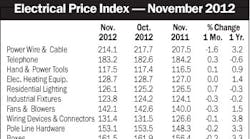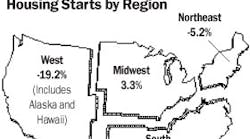With more than 30 distributor deals, and 19 manufacturer acqusitions, EM’s editors had plenty to write about in 2007. Here are our picks for the most interesting news stories of 2007.
Rexel, Sonepar and Consolidated Electrical Distributors (CED) lead another busy year for distributor acquisitions. The largest deal of them all was Rexel’s $4.5 billion buyout of its global rival Hagemeyer, and its subsequent sale of Hagemeyer’s U.S. operations to Sonepar, another global competitor. After the dust cleared, Rexel had added locations throughout Europe, gained an estimated $5.2 billion in sales, and solidified its position as the world’s largest distributor. Sonepar gained more than $500 million in sales and strengthened its coverage in the eastern United States with locations in the Carolinas, where it had wanted to grow, and in Maryland, West Virginia, and western Pennsylvania. The purchase also bolstered Sonepar’s industrial business.
The other mega-deal was the purchase of 70-plus locations from US Electrical Services Inc. LLC (USESI), Exton, Pa., by CED of Westlake Village, Calif. Deal-meister Richard Worthy, USESI’s CEO, had been busy with acquisitions during 2007, acquiring six companies. After his non-compete clause with Sonepar expired in January 2006, Worthy built USESI into a $400 million-plus business with the help of 11 acquisitions.
Other large 2007 acquisitions included the purchase of Roden Electrical Supply Co., Knoxville, Tenn., by Kendall Electric, Battle Creek, Mich.; Sonepar USA’s purchase of Crawford Electric Supply, Dallas, and Ralph Pill Electric Supply, Boston; the sale of HD Supply to several of the world’s largest private-equity firms; the sale of Shepherd Electric Supply, Raleigh, N.C., to State Electric Supply Co., Huntington, W.Va.; the sale of Cape Electrical Supply, Cape Girardeau, Mo. to a private-equity firm; the purchase of Minnesota Electric Supply Co., Willmar, Minn., by Border States, Fargo, N.D.; and Hagemeyer’s purchase of Bryant Electric Supply, Lowell, N.C.
Well over $2 billion in U.S. electrical sales changed hands in 2007 through the acquisitions of these EW Top 200 distributors. If you add up the global sales of the Hagemeyer operations that Rexel would retain, the combined total of 2007 global acquisitions would top $7 billion.
Private-equity firms take center stage in CED’s acquisition of USESI and the sale of HD Supply. Private-equity cash has long been the rocket fuel for the turbo-charged acquisition climate in the electrical wholesaling industry, and 2007 was no different. The purchase of HD Supply by Clayton Dubilier & Rice, Bain Capital Partners and Carlyle Group was the biggest private-equity-funded deal in 2007 in the electrical industry. On a smaller scale, Cape Electrical Supply was bought by Svoboda Collins LLC. Although private-equity Kelso & Co., New York, and the private-equity firm run by Michael Dell of Dell Computers funded the fast growth of Richard Worthy’s USESI, it’s also been speculated that those companies were eager to cash in on their investments in the electrical market when the lucrative offer came in from CED.
Another wild ride with copper prices. The surge and current decline in copper pricing reinforces the folly of trying to predict prices of this cyclical commodity. Copper spent most of the last two years at the rarified heights of more than three dollars per pound — always more than double and often triple its historical range of eighty cents to $1.20 per pound.
While some distributors reportedly attempted to stock up on wire and cable as a hedge on future price increases, many knowledgeable wire-and-cable insiders agree it’s a dangerous game to play. Demand from China, the impact of labor strikes on copper mines and speculative buying by commodity traders are all factors beyond the control of manufacturers, distributors and reps. While copper may not be a precious metal when compared to gold or silver, it will always be a precious commodity in the minds and warehouses of anyone who sells wire and cable.
The housing market goes thud. The decline of the U.S. housing market. It’s become a larger-than-life issue that’s even being talked about by U.S. presidential contenders on the campaign trail.
This is obviously a serious issue for the U.S. economy as a whole because the sub-prime loan crisis is starting to spread into other credit markets, tightening up lending and loan standards for businesses of all sizes. That being said, the electrical wholesaling industry is somewhat insulated from this mess because residential construction accounts for 24.7 percent of electrical distributors’ sales. That’s either a lot or a little depending on your perspective, but it’s smaller than the commercial market (30.6 percent) and the industrial market (26.1 percent).
The housing decline is somewhat limited in geographic scope to the states and local markets that enjoyed the boom years. According to the Department of Census and the National Association of Home Builders (NAHB), Washington, D.C., in 2006 (just past the peak of the housing surge), an estimated 47 percent of all housing permits were pulled in just six states: Texas (12 percent); Florida (11 percent); California (9 percent); Georgia (6 percent); North Carolina (5 percent); and Arizona (4 percent). Seven of the top 10 MSAs in terms of building permits were in these states, and these markets alone — Houston, Atlanta, Dallas, Phoenix, Riverside-San Bernardino-Ontario, Charlotte and Orlando — accounted for roughly 17 percent of all U.S. building permits in 2006.
The green market (finally) gathers steam. Industry veterans who have beat the drum for energy-efficiency for 25 years (and some silverbacks doing it since the oil crisis of the 1970s) must get a good chuckle from all the hoo-hah over green nowadays. It’s all great, but it’s not exactly a new trend. The early implementers in the electrical crowd have well-established niches in this business and will be tough to dislodge by anyone coming late to the party.
Acquisitions of electrical manufacturers and distributor software companies continue. It was an unusually active acquisition year for electrical manufacturers in many segments of the market. The lighting business saw the most action. Several big lighting companies acquired R&D expertise and manufacturing capacity in the fast-growing LED market. Royal Philips Electronics NV Netherlands, Dutch parent of Philips Lighting Co., Somerset, N.J., purchased innovative LED manufacturer Color Kinetics, Boston, early in the year, and near year-end announced a blockbuster acquisition of Genlyte Group Inc., Louisville, Ky., one of the world’s largest manufacturers of lighting fixtures.
Philips wasn’t the only lighting manufacturer making acquisitions. Cooper Industries, Houston, added several businesses to its Cooper Lighting business unit: WPI Interconnect Products, Salem, N.J.; Io Lighting, Vernon Hills, Ill.; and Powerline Communications Inc., South Burlington, Vt. Io Lighting and Powerline Communications manufacture LEDs.
Other large 2007 acquisitions included the purchase by Thomas & Betts Corp. Memphis, Tenn., of Lamson & Sessions, Cleveland, and its Carlon subsidiary; the sale of Tektronix, Beaverton, Ore., to Danaher Corp., Washington, D.C., for its Fluke Corp., test instrument business; and the purchase by Coleman Cable Inc., Waukegan, Ill., of Copperfield LLC, Bremen, Ind., and Katy Industries Inc., Arlington, Va.
The distribution software business continues to consolidate, and Activant Solutions, Livermore, Calif., is doing much of the acquiring. The company bought Intuit Eclipse Distribution, Mountain View, Calif., in 2007, and over the past few years acquired the Trade Service System and Prophet 21 software packages. On the data side of distribution software business, Trade Service Co. LLC, San Diego, was acquired by GF Capital, New York.
Leadership change at IDEA. The ouster of Mike Rioux, president of the Industry Data Exchange Association (IDEA), Arlington, Va., created quite a stir in the electrical industry’s IT circles because of how much IDEA had grown during his tenure and the industry-wide respect he had earned for his work there. Rioux’s replacement, Robert Gaylord, comes with an impressive resume of military and civilian accomplishments. He is a retired U.S. Army Brigadier General, and recently served as president and chief executive officer of the Leader to Leader Institute, New York.

